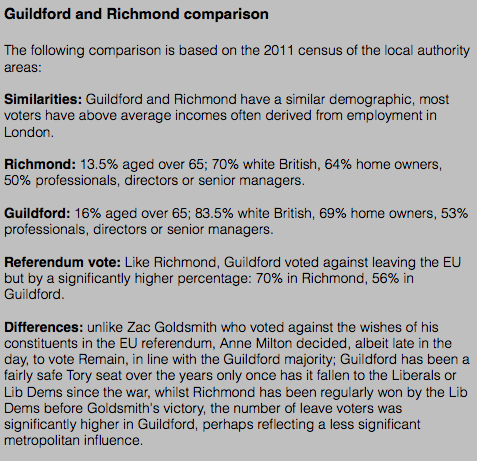 Abraham Lincoln
If given the truth, the people can be depended upon to meet any national crisis...
Abraham Lincoln
If given the truth, the people can be depended upon to meet any national crisis...
 Guildford news...
for Guildford people, brought to you by Guildford reporters - Guildford's own news service
Guildford news...
for Guildford people, brought to you by Guildford reporters - Guildford's own news service
Opinion: What Does the Richmond By-election Result Mean for Guildford?
Published on: 5 Dec, 2016
Updated on: 7 Dec, 2016
Does the result of the by-election in Richmond, only 20 miles away from Guildford, hold any lessons for our local political parties?
It is all too easy to read too much into such results. They might be a straw in the wind but then again they are one-offs, a snapshot of opinion in one location, at one point of time.
Of course it is easy for those flushed with victory to make statements that seem way over the top, even in the heat of the moment, let alone with the benefit of hindsight.
The winning candidate Sarah Olney did not disappoint on this score, she told Sky News: “It does look now as if we can have a vote in Parliament that might override the referendum. And I will, obviously, be voting to Remain because that is always what I have believed.”
Conservative Jacob Rees-Mogg, the losing by-election candidate Zac Goldsmith’s friend and supporter, was sceptical. He said: “The Lib Dems have nine MPs. They are not going to be able to force a second referendum,” and in another interview, “This was a vote on Brexit, this was a very strongly pro-Remain constituency and there is understandably a disgruntlement among those who are very strongly pro Remain that most of the country went against them.”
Certainly here in Guildford the disgruntlement referred to by Rees-Mogg was made apparent in a letter to The Dragon from Remain campaigner David Pillinger. Before the by-election (November 24). He wrote:”Regarding the precariousness of [Guildford’s MP] Anne Milton’s position, I would like to mention that there are many members of the “professional” classes living in Guildford who are natural constituents of the Conservative party.
“These people are generally incensed about Brexit. I have met a number who will be switching to vote Lib Dem unless the Tories can show leadership in maintaining strong ties with the EU, or treat the referendum as advisory and allow our elected Parliament to decide the course of action over this extremely complicated matter.”
Last night (December 4) he added: “It is highly likely that many, as in Richmond, will switch allegiance away from the party that allowed the mistake to happen.”
Naturally, the Lib Dems hope so. Guildford is said to be 15th on their party’s so called “Brexicution” list of target seats where Lib Dems came second to the Tories at the most recent General Election in constuencies which voted Remain.
Zoe Franklin, the Lib Dem’s prospective parliamentary candidate said: “The Liberal Democrat stance on Brexit is clear – we respect the result of the the referendum but do not agree that leaving the EU is in the best interests of Britain. Moreover the country did not vote on the destination in the referendum – whether we have a hard or soft Brexit – and must be given that opportunity.
“Guildford also voted remain in the referendum and residents reacted with deep sadness and anger over the Brexit result. Anne Milton has been virtually silent on the issue before and after the referendum and that will not sit well with Guildford voters whether Remainers or Leavers who prefer a ‘soft’ Brexit.
“We have seen Lib Dem membership surge since the 2015 general election and again since the referendum which means that we are in a strong position to run a passionate and visible campaign similar to Richmond Park. They proved that residents get behind campaigns with real energy. Combine that with the willingness of progressive voters to ‘lend’ their vote to the party who they see provides a progressive and realistic challenge to incumbent MPs who do not share their views and there is clearly no such thing as a safe Conservative seat any more.”
So will Anne Milton be looking over her shoulder? Perhaps. She was unavailable for comment but Leave campaigner Cllr Christian Holliday (Con, Burpham) gave his reasons why a parallel could not be drawn: “Firstly, Zac Goldsmith, standing as an Independent, did not have the full support of a party apparatus behind him. There was no Conservative candidate on the ballot paper last Thursday which will have affected voter motivation.
Secondly, at the next General Election the Liberal Democrats will not be in a position to bus volunteers in to fight just one seat, as they did in Richmond. Their resources will be spread more thinly.
Thirdly, it is also important to bear in mind turnout, whilst high for a by-election at 53.6%, was well down on the last general election turnout of 76.5%, with many Conservative voters staying away as no Conservative candidate stood and the by-election was not a vote to form a government.
Fourthly, whilst the Remain vote in Richmond in June was very high at 70%*, the result in Guildford was far more balanced between Remain and Leave 56% to 44%.
Finally, it should be noted that Richmond has been a Lib Dem seat for most of its recent history, so it wasn’t a ‘shock’ result in the sense of breaking new ground, rather reclaiming ground that it could be argued they should never have lost in the first place.”
 Of course the Conservatives will be hoping that Richmond is just a one-off Lib Dem success, as described by Holliday, but they remain deeply split on Europe and at least some of their supporters here in Guildford might be attracted to switch their political allegiance if they feel the Lib Dems are more likely to represent strong Remain views.
Of course the Conservatives will be hoping that Richmond is just a one-off Lib Dem success, as described by Holliday, but they remain deeply split on Europe and at least some of their supporters here in Guildford might be attracted to switch their political allegiance if they feel the Lib Dems are more likely to represent strong Remain views.
As for Guildford Labour their spokesman said: “I don’t think we can extrapolate outcomes for Guildford at this stage but local councillors should take note of the language they use, especially when they advocate for freedom of speech to be removed and people thrown in jail when they are against Brexit.”
But local Labour voters often do vote tactically against the Conservatives here in Guildford and, unlike Labour supporters in the North, are most likely to be Remainers. They could easily line up behind the Lib Dems too adding to a squeeze on Conservative support.
Meanwhile committed Leavers, if they feel that the government are heading for a soft Brexit, might switch to a, usually unfavoured, Ukip candidate.
If, and it might be a big if, all these factors come into play, Richmond shows us that even large majorities like Anne Milton’s 31,000 in 2015 are not unassailable.
None of this might affect our local politics you might think. Wrong. There is always a clear correlation between voting patterns at local elections and the views of national events.
David Pillinger spelt it out in his November letter when he signed off: “By the way, I think that the Local Plan is not that big a deal to most Guildfordians.”
He is probably right, whatever the likely impact of the Local Plan is on Guildford Borough, many voters are likely to be overwhelmed by their sentiments on the national issues, and this could be bad news for the Guildford Greenbelt Group.
Let’s remember in May 2015 some Guildford voters were said to be asking which local council candidate they should vote for to defeat the SNP!
*Note on EU referendum results: Exact results for Richmond Park constituency’s vote in the EU referendum is not available as the results were declared by London borough areas. However the two areas from which Richmond Park draws its voters voted as follows: Richmond upon Thames 69% in favour of remain (75,396 out of 108,806 valid votes) and Kingston upon Thames 62% in favour of remain (52,533 out of 108,838 valid votes).
Responses to Opinion: What Does the Richmond By-election Result Mean for Guildford?
Leave a Comment Cancel replyPlease see our comments policy. All comments are moderated and may take time to appear.
Recent Articles
- Guildford Institute’s Crowdfunding Project for Accessible Toilet in its New Community and Wellbeing Centre
- Letter: Guildford – Another Opportunity Missed?
- Letter: GBC’s Corporate Strategy – Where Is the Ambition?
- My Memories of John Mayall at a Ground-breaking Gig in Guildford Nearly Six Decades Ago
- Westborough HMO Plans ‘Losing the Heart of the Street’ Says Resident
- College Invests to Boost Surrey’s Economy and Close Digital Skills Gap
- Community Lottery Brings Big Wins for Local Charities
- GBC Housing Plan Promises ‘A Vibrant Urban Neighbourhood’ Near Town Centre
- Hospital Pillows ‘Shortage’ at the Royal Surrey
- Updated: Caravans Set Up Camp at Ash Manor School


Recent Comments
- Ian Macpherson on Updated: Main Guildford to Godalming Road Closed Until August 1
- Sara Tokunaga on GBC Housing Plan Promises ‘A Vibrant Urban Neighbourhood’ Near Town Centre
- Michael Courtnage on Daily Mail Online Reports Guildford Has Highest-paid Council Officer
- Alan Judge on GBC Housing Plan Promises ‘A Vibrant Urban Neighbourhood’ Near Town Centre
- John Perkins on GBC Housing Plan Promises ‘A Vibrant Urban Neighbourhood’ Near Town Centre
- S Collins on GBC Housing Plan Promises ‘A Vibrant Urban Neighbourhood’ Near Town Centre
Search in Site
Media Gallery
Dragon Interview: Local Artist Leaves Her Mark At One of England’s Most Historic Buildings
January 21, 2023 / No Comment / Read MoreDragon Interview: Lib Dem Planning Chair: ‘Current Policy Doesn’t Work for Local People’
January 19, 2023 / No Comment / Read MoreA3 Tunnel in Guildford ‘Necessary’ for New Homes, Says Guildford’s MP
January 10, 2023 / No Comment / Read More‘Madness’ for London Road Scheme to Go Ahead Against ‘Huge Opposition’, Says SCC Leader
January 6, 2023 / No Comment / Read MoreCouncillor’s Son Starts Campaign for More Consultation on North Street Plan
December 30, 2022 / No Comment / Read MoreCounty Council Climbs Down Over London Road Works – Further ‘Engagement’ Period Announced
December 14, 2022 / No Comment / Read MoreDragon Interview: GBC Reaction to the Government’s Expected Decision to Relax Housing Targets
December 7, 2022 / No Comment / Read MoreHow Can Our Town Centre Businesses Recover? Watch the Shop Front Debate
May 18, 2020 / No Comment / Read More














Bernard Parke
December 5, 2016 at 1:53 pm
This election was triggered by the London Airport issue and not by Brexit although this issue was brought into the campaign at some stage.
However, it must be remembered that, as Cllr Holliday points out, there was not a Tory candidate to defend government policy, so how can any real conclusion be drawn from this Liberal Democrat triumph?
Perhaps the government can learn a lesson from this result and allay this feeling of unease which is not any good for us or for our economy.
Jim Allen
December 5, 2016 at 1:55 pm
But the EU Referendum was not a Richmond or Guildford referendum but a UK-wide one, which clearly showed that both the Richmond and Guildford ‘elite’ are out of touch with the rest of the country.
George Dokimakis
December 5, 2016 at 1:57 pm
Considering the Richmond by-election was a personal election, since Goldsmith ran as an independent, it is worth noting that he was an extremely divisive candidate as evidenced from the London mayoral campaign.
Undoubtedly, quite a few people voted against him tactically to oust him and show that such approach has no place in politics.
David Wragg
December 5, 2016 at 2:08 pm
There is another factor in the Richmond result. Zac Goldsmith did not have to resign and force an election – to do so and then stand as an independent was sheer vanity. People who bring on unnecessary mid-term by-elections tend to be unpopular with the electorate. In fact, voters hate by-elections as the pressure on them from all the party workers from each and every party becomes a nuisance.
Jules Cranwell
December 5, 2016 at 6:24 pm
It may be for similar reasons, or different ones, but if the Guildford Tories continue on their path to ‘swap’ and destroy the green belt, I predict they will suffer a similar bloodbath at the next national and council elections.
They have misled the electorate twice now with their promises to protect the green belt. I don’t think they will be believed a third time.
Stuart Barnes
December 7, 2016 at 9:59 am
I see that it is being reported in several news papers that the Greens were paid £250,000 to stand down in the by election. Obviously we do not know whether that is true but the report apparently comes from within the local Richmond Green party and I have not seen it denied so far. Surprisingly (or not!) the “unbiassed” BBC does not seem to have reported it!
The Times report:
RWL Davies
December 10, 2016 at 1:53 pm
“These people are generally incensed about Brexit”; oh dear, how sad, never mind.
Remain lost and the Leave majority, which is now generally accepted as not entirely composed of intellectually challenged, ill informed, xenophobic deplorables, is clearly not incensed.
Parliament recently voted 461 to 89 to trigger Article 50 before April 2017, fully 30% of the parliamentary Lib Dem party abstained. Brexit will happen with no second referendum.
David Pillinger
December 15, 2016 at 4:30 pm
Mr Dokimakis makes a relevant comment about Mr Goldsmith’s performance in the London mayoral election. However, Mr Goldsmith’s problem was deeper than his divisiveness on the day.
As a strong Brexiteer, it was impossible for him ever to win the Mayoralty in London. London is the most international, globally competitive business centre in the world. Today, it is the thing of which we British are proudest.
People in London work in international teams, in an ever open world and are not dogged by prejudice. Consequently, Londoners are strong supporters of the EU. They understand the benefits of open business and the free international market for which the EU is the global gold standard: the Single Market and harmonisation of standards across 28 countries (and growing) is the biggest achievement the world has seen in the promotion of trade, wealth, and consequently, wellbeing for its participants, including the UK, of course.
Mr Goldsmith never got this. If he had, he would be a Remainer like the vast majority of Londoners.
That’s why he lost London.
John Perkins
December 16, 2016 at 1:00 pm
Mr. Pillinger makes the usual insupportable claims.
If one country (the UK) leaves a group of 28, how can it be described as “growing”?
People in London areas voted 60-40 to remain in the EU, but those voting in favour represented less than 42% of the electorate, which is itself only about two-thirds of London’s population. So about 28% of Londoners voted Remain. Not so much a “vast majority” as a large minority, albeit vocal.
As for the “free international market”, how come we are being told we must pay for access to it?
David Pillinger
December 17, 2016 at 10:28 am
My reference to “Free” market is in the sense of movement of goods and services i.e. unhindered.
Clearly it would cost to participate in such a thing as it would require administration, policing, dispute resolution, rule setting etc… that goes without saying, of course. No system comes without a cost.
T Hunt
December 19, 2016 at 8:23 am
Does Mr. Perkins assume that the same approach applies to the referendum in aggregate? The turnout across the UK was 72.5%, meaning that the 17.4m voting to leave represented 37.4% of the electorate as a whole. Not so much a “vast majority” as a large minority, albeit vocal.
C Stevens
December 15, 2016 at 9:35 pm
“…the Single Market and harmonisation of standards across 28 countries (and growing) is the biggest achievement the world has seen in the promotion of trade, wealth, and consequently, wellbeing for its participants, including the UK, of course.”
What about the southern European nations? Greece, Italy, and Spain haven’t seen too much in the way of “wealth, and consequently, wellbeing” recently. In any case, it’s far from clear that wealth does necessarily leads to wellbeing. Although there are many wealthy people in London, there are also many poor people. What does their wellbeing consist of? A meal in a soup kitchen? Has the EU done anything whatsoever to reduce financial inequality?
And if Londoners work in a world “not dogged by prejudice”, I wonder why employment tribunals and the courts are so busy with cases involving just about every “ism” David Pillinger cares to mention.
I think what Richmond and the leave vote tell us is that people now understand the power of the ballot box.
David Pillinger
December 17, 2016 at 4:14 pm
Brexiteers commentary is always so simplistic.
Spain has one of the the highest growth rates in the OECD and its major banks did not need bailing out, unlike British ones, Greece ran too large a deficit (this is of their doing, as is our own huge UK deficit, and nothing to do with membership of the EU) and Italy suffers sclerotic government owing to a rubbish constitution which Matteo Renzi, the PM, has desperately tried to loosen up in the face of spoiling opposition from the usual suspects of populists (again, this matter is totally unrelated to membership of the EU).
Further, London is a very tolerant society. It’s problems are to do with our British sovereign government policy, not the EU. The EU’s task is not to deal with inequality, it is to create harmonisation and trade so that nations can trade more easily. Our British sovereign government deals with tax policy, redistribution and the provision of government services, and the EU has no say in this ever.
What we must do is deal with inequality and opportunity for the disaffected ourselves by voting in sensible governments with good manifestos, not dissing the EU which is not involved in this area.
Would one blame today’s bad weather on the EU, or losing to Iceland in the Euros? They are also completely irrelevant to the argument of Brexit! It is embarrassing that these arguments are brought up.
C Stevens
December 18, 2016 at 11:13 am
What I was saying was that not everything in the EU garden is lovely and fudging the issues, to make it appear so, will not wash.
Spain has an unemployment rate of over 22%, which particularly impacts on young people where the rate is nearer 50%.
Greece was inappropriately allowed to join the Euro and, after the economy tanked, subjected to harsh financial constraints by the EC, the ECB and Germany in return for bailout money.
So is David Pillinger saying that Italy has had no benefit at all from being an EU member?
As to the influence of the EU on UK government policy, did I dream the Human Rights Act and the seemingly perverse decisions to which it has led? Is the European Court of Justice only something off the telly, a bit like Judge Rinder?
I accept that I’m a bit simple so explain slowly, please.
David Pillinger
December 18, 2016 at 12:49 pm
To answer Mr Steven’s question, Italy and the other countries have all benefited from EU membership. The high unemployment rates in Spain and labour laws that cause them have nothing to do with EU membership. They are of Spain’s own making, like our own labour laws are.
We had a similar situation in the past but amended the laws. The situation would be worse without the EU because there would be less business, wealth creation and tax collection.
As to your comment about the Human Rights Act and all that other stuff, if its not the EU it will be a UK body doing exactly the same thing. Get rid of one and you replace it with another body of rules or law.
Most commentators would prefer an impartial body or law created by consensus of a number of democratic countries to some of the party political patronage you see in the UK, or any other country.
The minds of many make for better policy, always, in government, business or family. It just makes sense.
John Perkins
December 19, 2016 at 12:31 pm
We are being asked to believe that all the good that has happened in Europe is down to the EU, whereas all the bad is the responsibility of individual nations?
If the minds of many make for better policy, how come we have that old expression “a camel is a horse designed by a committee”?
Robert Park
December 20, 2016 at 10:50 pm
I would, with respect, suggest that Mr Stevens studies the Human Rights Act and its implementation over the past nearly twenty years. He will probably conclude that this legislation has many positive benefits for himself and fellow citizens, despite the distortions put about by the popular press, which is why there is cross-party support for its retention, including from many Tories.
The Human Rights Act was independently passed by our own Parliament back in 1998, with cross-party support. The Act simply incorporates the Convention on Human Rights – itself largely drafted by British lawyers, in the aftermath of the Second World War – into our own law. The Convention was adopted by the Council of Europe in 1950 – a body set up after the Second World War to promote democracy, human rights and the rule of law in Europe – it has nothing to do with the European Union.
C Stevens
December 22, 2016 at 7:38 pm
Yes. EU directives would have been a better example.
D Bisdee
December 17, 2016 at 7:57 pm
I find it strange that people say that Sarah Olney won in Richmond because Goldsmith lacked the support of the Conservative party! this is just not true, as they decided not to field an official candidate against him. Presumably if he had been re-elected, he would have rejoined the Conservative benches.
Also surprising that the article quoted Cllr Christian Holliday, who is surely discredited due to his ridiculous statements about trying Remainers for treason. Not a good idea to offend your his own voters.
Some of the comments refer to a Richmond and Guildford elite. I really hate this nonsense. Working at the Citizens Advice as I do, I can vouch for the fact that there are plenty of poor and homeless people in our area. We have food banks and homeless shelters in Guildford just as they may do in areas people would not regard as ‘rich’ e.g. Liverpool, Doncaster or Hastings.
John Perkins has fallen into his own trap. Only 37.4% of the UK electorate voted to leave the EU, i.e. only just over a third, and less than three percentage points more than those who voted to Remain (34.6%). Hence, the ‘Leavers’ are also no more than a vocal minority of the electorate. The vast majority of the electorate (62.6%) did NOT vote to leave. So much for ‘the will of the people’.
As for our MP, I do wish she would sometimes say what she personally thinks instead of spouting the party line – she even does so in letters to individual constituents. I sometimes think we are represented by someone who automatically puts party first.
John Perkins
December 18, 2016 at 1:39 pm
I am well aware that our voting system is imperfect and was merely refuting the absurd claim: “a Remainer like the vast majority of Londoners”.
Sue Doughty
December 18, 2016 at 11:28 am
As someone who spent a lot of time in Richmond, there are some key facts which are relevant here.
Both Sarah Olney and Zac Goldsmith oppose Heathrow Expansion, something Goldsmith was aware of when he forced the election.
On the doorsteps people did have a strong opinion on Brexit and were deeply unhappy about the lack of a coherent government strategy for dealing with the outcome. I met a number of people who had campaigned for Goldsmith in the past who could not do so now given his Brexit stance. They weren’t necessarily Tories.
Out on the doorsteps was however Jacob Rees-Mogg who is pro Heathrow expansion. As stated above, this was a vanity election and in the face of a strong campaign by an excellent candidate more in touch with local people it was no surprise that Goldsmith lost.
Bernard Parke
December 18, 2016 at 11:55 am
We must not forget that the electorate tends to vote for the party and not on the suitability of the person to do the job, as we have often found out at our cost.
Fortunately, we cannot say that about our present MP who always does put our people first and listens to their needs. We are extremely fortunate to have such a person.
I am unbiased in stating this as I am not a member of any party.
Robert Park
December 18, 2016 at 2:50 pm
Not only did the Lib Dems do spectacularly well in Richmond with an anti-Brexit campaign, but they have convincingly won a series of local government by-elections, especially in the West Country.
There is also evidence emerging that parts of the country such as the North East, which were strongly for Leave, are having a change of heart, now they realise that some of their unrealistic hopes such as re-opening coal mines, were just nonsense.
The local Labour parties, in Guildford, South West Surrey and adjoining areas are strongly for Remain, and pretty unhappy with the rather ambiguous statements coming from their national leaders.
In South West Surrey particularly we are signed up to the idea of a Progressive Alliance. One of the key motivations is that the Lib Dems are firmly supporting the “48%” and are battling to prevent the utter disaster of a “hard Brexit”, which will do immense harm to us and to the rest of Europe, for absolutely no obvious gain.
Colin Cross
December 22, 2016 at 11:00 pm
Remember the phrase “Progressive Alliance”. It will mean a lot more to all of us come the next election. Why? Because it will truly represent the actively voting majority in this country, for the first time.
We will see then what the public, as a whole, have made of David Cameron’s pathetic performance, Nigel Farage’s terminological inexactitudes and Mr Corbyn’s disappearing act and telling silence.
There is another way in UK politics and we are about to witness it in action.
Colin Cross is the Lib Dem borough councillor for Lovelace ward